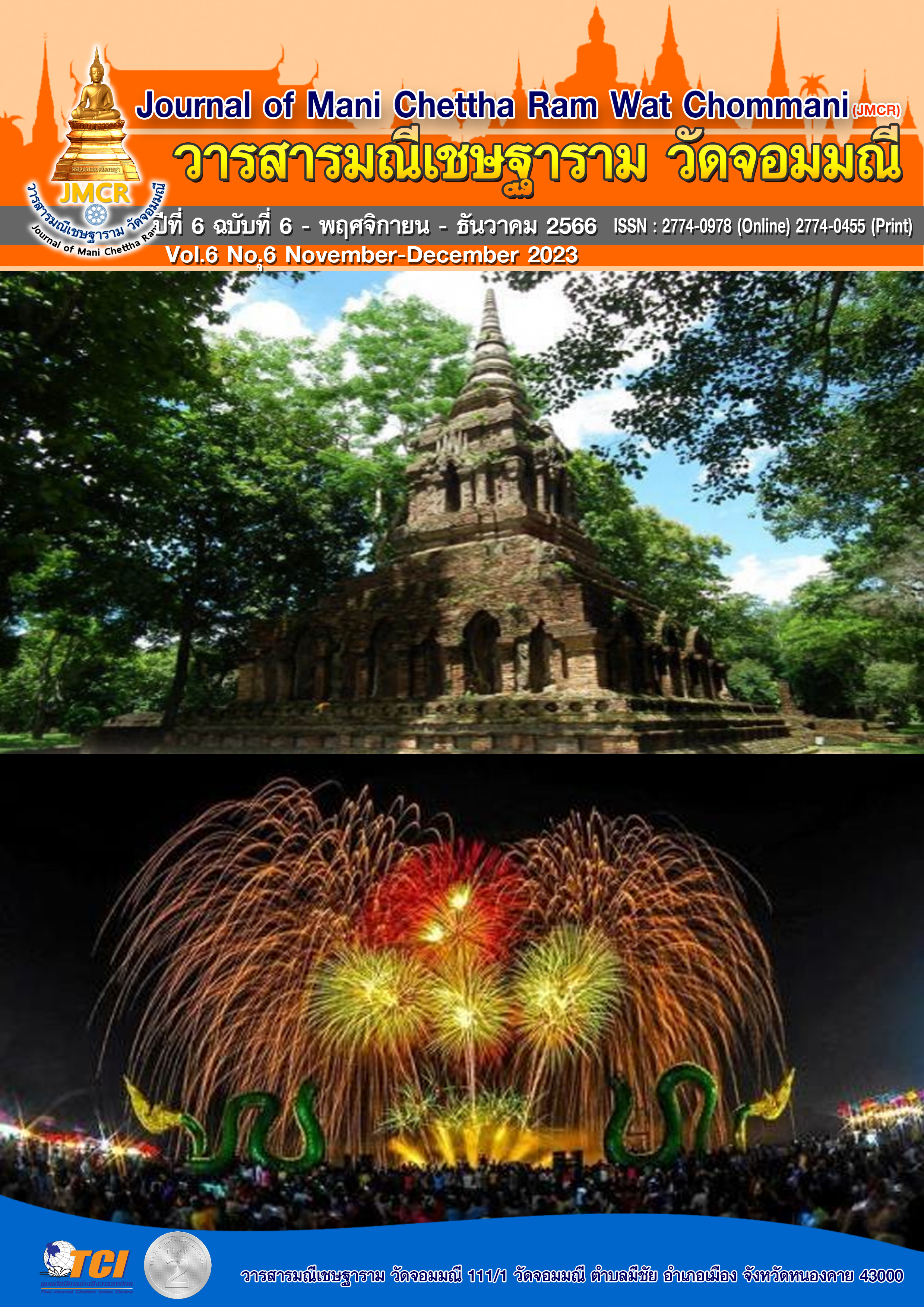องค์ประกอบสมรรถนะผู้บริหารวิทยาลัยอาชีวศึกษาเอกชนในภาคตะวันออกเฉียงเหนือ
คำสำคัญ:
องค์ประกอบสมรรถนะผู้บริหาร, วิทยาลัยอาชีวศึกษาเอกชนบทคัดย่อ
การวิจัยครั้งนี้มีวัตถุประสงค์เพื่อ 1) ศึกษาองค์ประกอบสมรรถนะผู้บริหารวิทยาลัยอาชีวศึกษาเอกชนในภาคตะวันออกเฉียงเหนือ และ 2) ยืนยันองค์ประกอบสมรรถนะผู้บริหารวิทยาลัยอาชีวศึกษาเอกชนในภาคตะวันออกเฉียงเหนือ กลุ่มตัวอย่าง คือวิทยาลัยอาชีวศึกษาเอกชนที่อยู่ในภาคตะวันออกเฉียงเหนือ ในปีการศึกษา 2566 จำนวน 64 วิทยาลัย จาก 75 แห่ง ผู้ให้ข้อมูล คือ ผู้บริหาร ครูผู้สอน และเจ้าหน้าที่ รวมผู้ให้ข้อมูลทั้งสิ้น 320 คน ใช้วิธีการสุ่มตัวอย่างแบบหลาย เครื่องมือที่ใช้ในการวิจัย คือ แบบตรวจสอบรายการและแบบสอบถามแบบมาตราส่วนประมาณค่า 5 ระดับ มีค่าความเชื่อมั่นที่ 0.95 สถิติที่ใช้ในการวิเคราะห์ข้อมูล ได้แก่ ค่าความถี่ ค่าร้อยละ ค่าเฉลี่ย และส่วนเบี่ยงเบนมาตรฐาน การวิเคราะห์องค์ประกอบเชิงสำรวจ และการวิเคราะห์เนื้อหา
ผลการวิจัยพบว่า 1. องค์ประกอบสมรรถนะผู้บริหารวิทยาลัยอาชีวศึกษาเอกชนในภาคตะวันออกเฉียงเหนือที่มีประสิทธิผลทั้งหมดมี 8 องค์ประกอบ ดังนี้ 1) สมรรถนะด้านวิชาชีพและการบริหาร 2) สมรรถนะด้านภาวะผู้นำและการจัดการ 3) สมรรถนะด้านแก้ปัญหาในองค์กร
4) สมรรถนะด้านการวางแผนและการประกันคุณภาพ 5) สมรรถนะด้านบทบาทหน้าที่
6) สมรรถนะด้านการสื่อสารในองค์กร 7) สมรรถนะด้านคุณธรรมจริยธรรม และ 8) สมรรถนะด้านการสร้างภาพลักษณ์องค์กร 2. องค์ประกอบสมรรถนะผู้บริหารวิทยาลัยอาชีวศึกษาเอกชนในภาคตะวันออกเฉียงเหนือที่มีประสิทธิผล ประกอบด้วยองค์ประกอบสำคัญ 8 องค์ประกอบ มีความถูกต้อง มีความเหมาะสม มีความเป็นไปได้ และสามารถนำไปใช้ประโยชน์ได้ ซึ่งสอดคล้องกับกรอบแนวคิดและทฤษฎีของการวิจัย
เอกสารอ้างอิง
ชวนพิศ สิทธิ์ธาดา. (2562). รูปแบบสมรรถนะของผู้บริหารสถานศึกษาขั้นพื้นฐานที่มีประสิทธิผล. ใน วิทยานิพนธ์ปริญญาปรัชญาดุษฎีบัณฑิต สาขาวิชาการบริหารการศึกษา บัณฑิตวิทยาลัย มหาวิทยาลัยศิลปากร.
ประชาชาติธุรกิจออนไลน์. (2562). มึนอาชีวะเอกชน 59% มี น.ร.ต่ำ 500 คน สอศ.ห่วงทยอยปิดตัว-เล็งว.รัฐรับจำกัด. เรียกใช้เมื่อ 14 พฤษภาคม 2566, จาก http://www.prachachat.net/
news_detail.php?newsid=1456127545
รพีพรรณ ฉัตรเลิศยศ. (2561). การศึกษาจริยธรรมของหัวหน้างานที่มีต่อผู้ใต้บังคับบัญชา: ศึกษากรณีพนักงานเลขานุการสตรีในสมาคมเลขานุการสตรีแห่งประเทศไทย. เรียกใช้เมื่อ 5 ธันวาคม 2565, จากhttp://www.bu.ac.th/knowledgecenter/epaper/july_dec2004/rapepan.pdf
สำนักงานคณะกรรมการการศึกษาแห่งชาติ. (2553). พระราชบัญญัติการศึกษาแห่งชาติ พ.ศ. 2542 ที่แก้ไขเพิ่มเติม (ฉบับที่ 2) พ.ศ. 2545 และ ฉบับที่ 3 พ.ศ. 2553. กรุงเทพมหานคร: บริษัท พริกหวานกราฟฟิค จำกัด.
สำนักงานเลขาธิการสภาการศึกษา, กระทรวงศึกษาธิการ. (2560). สมรรถนะการศึกษาไทยในเวทีสากล พ.ศ. 2559. กรุงเทพมหานคร: สำนักงานเลขาธิการสภาการศึกษา.
Clark, C. M. (1995). Thoughtful teaching. London: Cassell.
Madaus, G. F.; Scriven, M. S. and Stufflebeam, D. L. (1983). Evaluation models’ viewpoints on educational and human services evaluation. 8th ed. Boston: Khuwer-Nijhoff Publishing.
Weiler, N. W. and Schoonover, S. C. (2001). Your soul at work: Five steps to a more fulfilling career and life. Idoha: Hidden Springs.
Yamane, T. (1973). Statistics: An introductory analysis. 3rd ed. New York: Harper and Row Publication.




